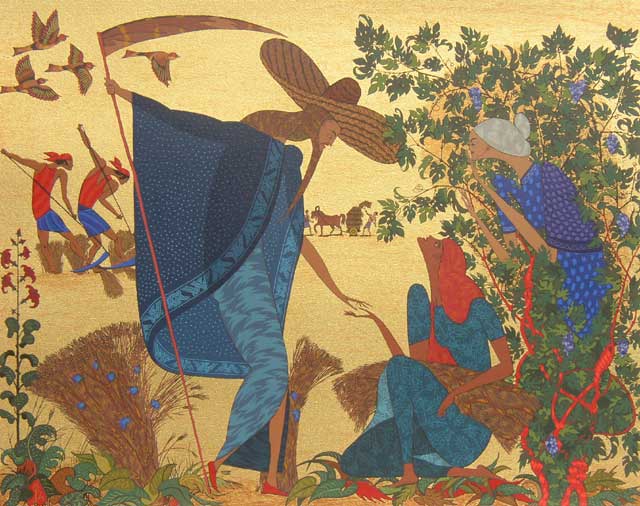 Ruth and Boaz (the stylistic work of Polish-Iraeli artist Shlomo Katz see here for more)
Ruth and Boaz (the stylistic work of Polish-Iraeli artist Shlomo Katz see here for more)Reading for Pentecost 23, Sunday 8th November 2009 (Proper 32) Ruth 3:1-5, 4:3-17; Psalm 127; Hebrews 9:19-28; Mark 12:38-44
There is certain profound gentleness about this week's readings.The story of a woman who finds a genuine life partner. And who against all odds becomes the mother of a great man.
And the gentle reassurance of the woman whose generosity is seen by God; even though she gives little in "real terms" she gives everything she has in hers
and God see this
and we recognise it and so we are heartened.
In the middle of this there is something of a sterner reminder
that God abhors hypocrisy
and that there is about life the mystery of sacrifice
which tests us to the very core of who we are.
The writer to the Hebrews spells out in great detail
that sacrifice is at the core of what our relationship with God is all about.
Getting it straight
Now we need to understand that there is a common misconception about sacrifice
and that is that it is essentially about the taking away of life.
This is not necessarily or particularly so. ]
In fact if we look at the detailed instructions about sacrifice in the Hebrew scriptures ]
we see that a lot of it is not about animal slaughter at all
There are all sorts of sacrifices of grain and produce which do not involve bloodshed.
In fact if we look at the word sacri-fice
we can see that it is about making (the fice part of the word) things
sacred or holy (the sacri part of the word)
Christ died that we might be made holy
In fact the writer of Hebrews uses the idea of Christ entering into God's presence
(going into the most holy place)
so that we too might enter into that presence
Simple reflection
The story of Ruth is an interesting but gentle tale.
It seems a simple love story
yet it needs also to be read in the context of the sort of ethnic tensions
that still exist in those lands we call HOLY today.
Ruth was not a Jew she was what today we would call a Lebanese, or Syrian, perhaps even an Iraqi.
Yet her faithfulness to her Jewish mother-in-law
and her willingness to do what needed to be done
saw a simple little tale become an object lesson in the all accepting love of God.
The Jews were racked by ethnic division then as now.
And yet we read of one the greatest heroes (in backwards order)...his father was Jesse, his grandfather was Obed, who was the child not of a Jew but of a Moabitess.
David was the great grandson of an outcast.
Be careful about what you hear.
There is more than meets the eyes.
Likewise in the letter to the Hebrews
it is the call for us to be holy
and the permission to enter the closest presence of God that we need to hear.
Not just the bloody sacrifice of Christ.
So obsessed are we about guilt and sin that we fail to hear that there is cause for rejoicing.
Christ died, so that we could be close to God.
God is close, not far.
Don't push him away
Finally
A simple tale that we all know to be true .. the rich can afford to be generous
But do we also pay attention to the great warning
God is not looking for who gives the most either in real dollar terms or even proportionately.
God looks at the heart and despises hypocrisy.
The hypocrisy that judges others and fails to critique oneself.
THIS WEEK Where is God inviting me to be tolerant?
To step outside my prejudices and to be more accepting?
Where do I hold back from drawing close to God?
Is there a time and place to be quiet and listen?
Is there an opportunity to serve God through care for others?
Where in my life am I most hypocritical? Where can I change and be more honest?

